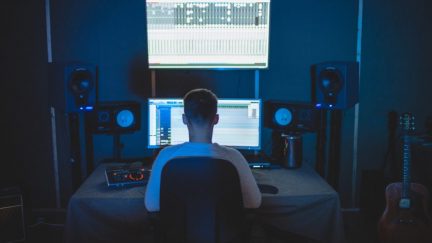What does a freelance Music Producer do and when should I hire one?
We’ve all heard of legendary music producers such as Dr. Dre, Trent Reznor and Rick Rubin. While not all music producers enjoy the same level of esteem and notoriety as these, they carry the same set of unique behind the scenes skills that engineer a musician’s work to make it sound pristine and professional and release-ready. With the increased availability of home studio production, the doors have opened for all manner of musicians to work on their own projects in the comfort of their own home.
This has of course seen a boom of a freelance music producer workforce that are able to hone their high-level technical skills and assist on music production projects remotely using their own studio equipment. This can be anything from helping clients produce soundtracks to a video game, mastering existing work from an existing artist, or even collaborate directly on creating beats and jingles for advertising campaigns.
But what does this actually involve? What key day-to-day tasks does the average music producer undertake and how do you know what to look for when hiring a good freelance music producer? In this guide, we’ll debunk some of the mysteries around music production and what exactly it is they do.
The Day to Day of a Music Producer
While the actual specifics of tasks of music production are detailed and varied, there are a few overarching themes that encompass every music producer across any given project. In a nutshell, the role of the music producer across any given musical venture is to assume the role of the “project manager” for the recording and mixing process. On a high level, they are assigned an overall goal for what the end product is supposed to look like and serve as an inspiration to musicians to achieve this.
Partly how this “vision” is achieved is through the process of engineering. Engineering is perhaps what you’d envision when imagining the typical image of a music producer: that of somewhat of a mad scientist hunched over a desk with hundreds of knobs and buttons and several computers to manipulate recordings. This process involves engineering and applying a number of effects such as compression and reverb while mixing the levels and panning of individual instrument tracks. Through various rounds of recording takes and fine tunings using these different arrays of equipment, music producers help achieve that polished sound that consumers eventually hear on record.
From a freelance music producer or remote working perspective, this would involve on and off collaboration with a musician via the medium of sound file sharing. The role of the producer here would be to apply the aforementioned effects and mixes using their home studio setup with the final desired outcome being achieved by various rounds of back and forth sharing of edits.
Styles and Sampling
Throughout the journey to achieve the final product, certain music producers may be hired for their certain specialist styles or hallmarks. Throughout musical history there have been music producers known almost exclusively for their unmistakable signatures. A prime example of this being controversial music producer Phil Spector’s “Wall of Sound” technique which can be heard on many of the records he’s produced.
While not every music producer will own their own unique style, you can expect to find freelance music producers that specialist in certain musical genres and know what to do when faced with rough cuts belonging to these genres.
This can also extend to “sampling”, that being the procedure of adding musical segments an effects from existing music to enhance the track and add a bit of pizzazz. Sampling is a technique particularly prevalent in electronic and rap music, though you can expect most music producers to be well-versed in the practice.
Mentoring and Directing
Relaying back to the idea of project management within music, music producers also have to employ hardy skills in this department to ensure that deadlines and hit and projects run smoothly. Aside from this, good music producers also serve as mentors and directors and are expected to try and get the best out of the musicians they’re working with by pushing them in new directions and making them challenge their own ability. Like any creative force, talent in musicianship, be it song writing or soundtrack writing does need to be honed and focused by somewhat of a “parental figure” within the room, which is where the role of the music producer can come in to play.
Some may of course have their own unique styles of this however, depending on the musician and project they’re working with. Some may prefer to elicit inspiration or mentorship by playing a more hands-off role in the process, instead encouraging musicians the freedom to express their creativity, which may in turn see boundaries pushed. Other music producers may prefer a more direct route in terms of what they want to see from their musical colleagues. This may see music producers assert more of their authority in the studio or at home and take on the role of the “director” in order to push musicians to achieve the desired outcome.
How Can I Find a Good Music Producer?
Like any industry, the role of the music producer is changing. While previously positions like sound engineers and mixers had their on specific tasks, this has evolved to see the music producer getting involved in every stage of the musical creation process. These days, many solo artists and multi-instrumentalists take on the role of music producers in their own right, creating their tracks and applying their own engineering touches in the studio themselves.
With the current increase in remote and flexible working in general across many industries, connecting to a talented freelance music producer is easier than ever, and you won’t have to consider the oftentimes costly overheads of studio and equipment rental.









